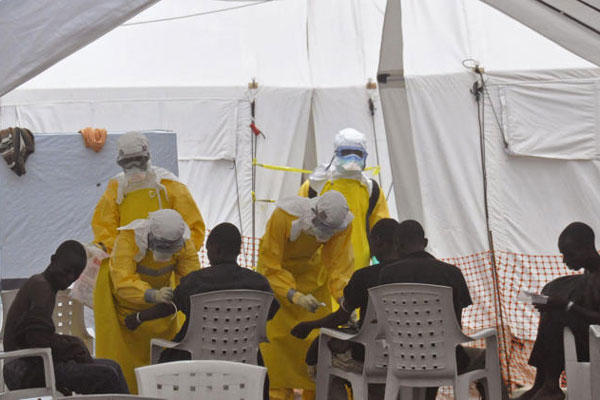The commanding general of the 101st Airborne Division and 700 of his troops will head to Liberia in late October as the military steps up its response to the Ebola crisis in West Africa, the Pentagon announced Tuesday.
The "Screaming Eagle" troops from Fort Campbell, Kentucky, will set up a headquarters in Monrovia, the Liberian capital, and will be joined by 700 combat engineers from several commands, the Pentagon said.
Once the troops have arrived, Army Maj. Gen. Gary Volesky, commander of the 101st, will replace Maj. Gen. Darryl Williams, as commander of the U.S. military response to the Ebola epidemic that has hit hardest in Liberia, Guinea and Sierra Leone. Williams will return to his post as commander of U.S. Army Africa, the Pentagon said.
Aid groups and officials in West Africa have complained about what they called the slow pace of the U.S. and the international community's response to the epidemic. Rear Adm. John Kirby, the Pentagon spokesman, took particular issue with published reports calling the military's efforts thus far "slow-footed."
"I just flatly disagree," Kirby said at a Pentagon briefing. "It takes some time, it takes some logistics expertise" to organize the response outlined by President Obama two weeks ago when he announced that 3,000 U.S. troops would be deployed to West Africa.
Obama's announcement on Sept. 16 came six months after the outbreak in West Africa of history's worse Ebola epidemic.
Kirby stressed that "everybody in the military shares the sense of urgency" as the epidemic worsens. The World Health Organization has reported that cases of Ebola and deaths have escalated in recent weeks.
Army Gen. Martin Dempsey, chairman of the Joint Chiefs of Staff, also issued a statement defending the military's response.
He said the military's efforts would "support U.S. government and international relief efforts by leveraging our unique U.S. military capabilities."
"Specifically, we're establishing command and control nodes, logistics hubs, training for health care workers, and providing engineering support," Dempsey said. "The protection of our men and women is my priority as we seek to help those in Africa and work together to stem the tide of this crisis."
Kirby also said the military efforts were part of a "whole of government" approach that involved the U.S. Agency for International Development and the Centers for Disease Control.
Currently, about 195 U.S. military personnel are in Liberia, Kirby said. They are involved in locating and preparing sites for facilities to treat health care workers who may have contracted the virus.
A 25 bed facility was expected to be operational by mid-October in Liberia and 17 other 100-bed facilities were planned.
Obama also pledged that the military would set up an Intermediate Staging Base in Senegal to serve as an "air bridge" for channeling medical personnel and supplies to the region. Currently, there are no U.S. military personnel in Senegal, the Pentagon said.
Kirby said that all military personnel deployed to West Africa would be trained in the use of protective gear "and on the disease itself" although "U.S. military personnel are not and will not" be in direct contact with Ebola victims, Kirby said.
Kirby said that the deployments to West Africa were expected to last six months but could go longer, depending on whether the virus was contained. Kirby also said that the military response could also be expanded to involve more than 3,000 troops.
The World Health Organization reported Tuesday that the number of Ebola patients in Guinea, Liberia and Sierra Leone had passed 6500, with more than 3,000 deaths recorded.
-- Richard Sisk can be reached at richard.sisk@monster.com






























